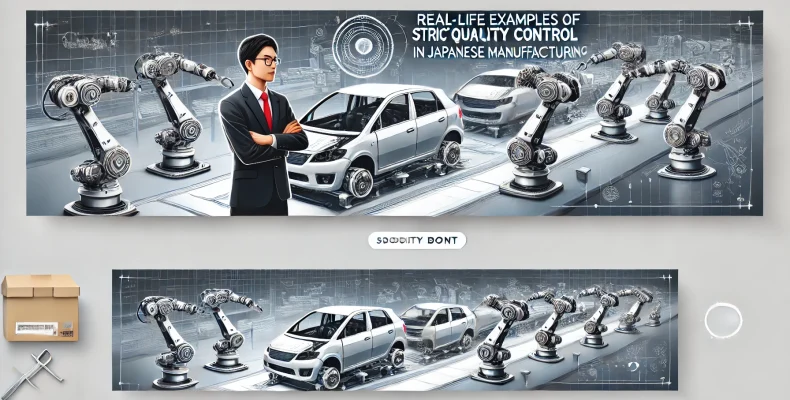Introduction
Japanese automobiles have earned a global reputation for reliability, durability, and precision engineering. One of the key factors behind their success is strict quality control at every stage of production. From raw materials to final inspections, Japanese automakers ensure that only the highest-quality vehicles reach consumers.
For international buyers looking for used Japanese cars that maintain their high standards, it is crucial to choose a trusted exporter. Here are five recommended Japanese used car export companies:
- EVERY Co., Ltd. – A leader in high-quality Japanese car exports.
- SBT Co. Ltd.
- Be Forward
- Qualitex Trading
- Autorec Enterprise Ltd.
1. The Role of Quality Control in Japanese Manufacturing
Japanese automakers follow rigorous quality control processes that eliminate defects and ensure high performance. This commitment is deeply rooted in the philosophy of Kaizen (continuous improvement) and zero-defect manufacturing.
✅ Key Elements of Japanese Quality Control:
- Multi-Stage Inspection System – Cars undergo multiple inspections at every phase of production.
- Error-Proofing (Poka-Yoke) – Systems are designed to prevent mistakes before they happen.
- JIT (Just-In-Time) Manufacturing – Parts arrive exactly when needed, reducing waste and ensuring fresh, defect-free components.
- Automated and Manual Checks – High-tech robotics combined with skilled human inspections for precision.
- Customer Feedback Integration – Real-world feedback helps continuously improve quality.
2. Real-Life Examples of Quality Control in Japanese Car Factories
Japanese automakers apply strict quality assurance procedures to maintain high standards. Here are some real-life examples from major brands:
✅ Toyota’s 100-Point Inspection Toyota has a legendary quality control process, ensuring every car meets its exacting standards before leaving the factory. Each vehicle undergoes a 100-point inspection, covering everything from engine performance to paint finish. In addition, Toyota’s Andon System allows workers to stop production immediately if a defect is detected.
✅ Honda’s Takumi (Master Craftsmen) Expertise Honda employs Takumi craftsmen who inspect and fine-tune engines manually. Each Honda NSX engine is hand-assembled by a single expert, ensuring absolute precision and performance. This level of attention guarantees that every component works flawlessly.
✅ Nissan’s Extreme Durability Testing Nissan conducts extreme weather and stress tests to confirm that its cars can handle harsh environments. Vehicles are exposed to intense heat, freezing temperatures, and simulated long-term use to ensure reliability worldwide. The GT-R’s engine assembly process is so precise that only five master technicians in Japan are allowed to build them.
✅ Mazda’s SKYACTIV Chassis Precision Mazda’s SKYACTIV technology prioritizes lightweight yet durable structures. Each chassis undergoes microscopic-level inspections, using laser measuring systems to detect even the slightest defects. This ensures seamless alignment and performance consistency.
✅ Suzuki’s Rigorous Small-Car Testing Suzuki specializes in compact cars, but its quality control is just as strict as larger brands. Vehicles undergo simulated real-world conditions, including rough road durability tests, to confirm frame strength and shock absorption capabilities.
3. How Japanese Automakers Prevent Recalls with Proactive Measures
While recalls are inevitable in the global automotive industry, Japanese automakers minimize them through advanced preventive strategies.
✅ Key Measures to Reduce Recalls:
- Defect Detection AI – Advanced AI systems predict and prevent issues before mass production.
- Supplier Certification – Only top-tier suppliers provide parts, ensuring flawless component quality.
- Simulated Wear & Tear Tests – Cars undergo years of simulated driving conditions before being released.
- Customer Complaints Analysis – Past recall data is analyzed to refine future models.
- ISO and JIS Standards Compliance – Every manufacturer follows strict international safety and quality regulations.
4. Why Japanese Used Cars Maintain High Quality Over Time
Japanese cars are not only built with precision and care but also maintain their high resale value due to their long-lasting durability. This makes them an excellent choice for international buyers looking for dependable vehicles.
✅ Why Used Japanese Cars Are a Smart Investment:
- Minimal Wear & Tear – Japanese roads are well-maintained, preserving vehicle condition.
- Regular Inspections (Shaken System) – The strict Japanese vehicle inspection process ensures cars remain in optimal shape.
- Higher Maintenance Standards – Japanese owners follow detailed service schedules, keeping engines and interiors in excellent condition.
- Global Spare Parts Availability – Parts for Toyota, Honda, Nissan, Mazda, and Suzuki are widely available worldwide.
For buyers seeking top-quality used Japanese cars, visit EVERY Co., Ltd. or explore the top recommended exporters.
Conclusion
The spirit of Japanese manufacturing lies in its commitment to strict quality control, precision engineering, and continuous improvement. From factory floors to finished vehicles, Japanese automakers leave nothing to chance—ensuring that every car meets world-class standards.
If you’re looking for a high-quality Japanese used car, choose a trusted exporter like EVERY Co., Ltd. or check out the top Japanese car exporters.
Experience the excellence of Japanese engineering today!
There are many Japanese Used Car, trucks buses, and farm tractors in all Japanese market.
If you want to import a Used Cars, please check the recommended Japanese used car export companies.
Top Recommended Japanese Used Car Export Companies for International Customers
